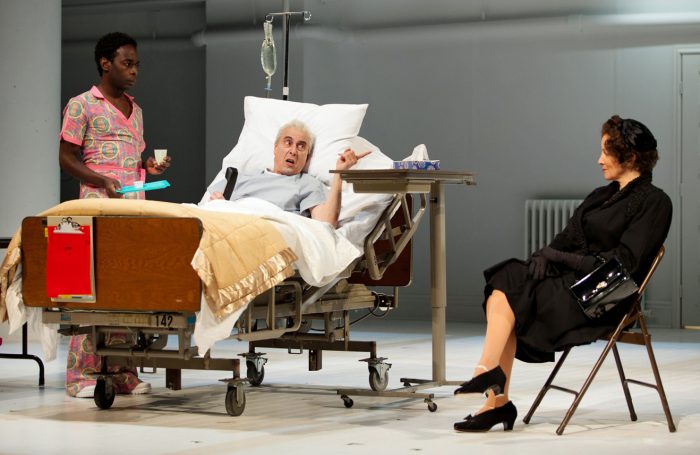
Angels in America. A Gay Fantasia on National Themes. Part Two: Perestroika. By Tony Kushner. Directed by Blanka Zizka at the Wilma Theater, 2012.
The Wilma production of Angels in America: Perestroika confounds expectations. In a good way.
A consensus of critics has been that this second part of Angels is less appealing than the first part, due to longer speeches, more emphasis on the supernatural, and an opening monologue by The World’s Oldest Bolshevik which makes less audience connection now than when the play was new, right after the December 1991 dissolution of the Soviet Union.
In the face of those dangers, this Perestroika made a strong impact. The monologues are poetry, summing up what’s played out through the two sections of this play. Sort of like Jess Stacy’s quiet piano solo at the end of “Sing Sing Sing” by the Benny Goodman band at its 1938 Carnegie Hall concert. And the presence of angels is neatly tied in with the biblical history of Bethesda and the Bethesda statue in Central Park. the AIDS epidemic metastasizes amidst governmental neglect. Kushner muses about history, politics, society, healthcare access for the privileged, religion and the apparent absence of God.
Blanka Zizka has directed brilliantly, aided by the superb cast which she hired. The players don’t push for laughs; they never mug or underline their words, yet more humor comes through than in any previous staging of this work.
An example of a good throwaway exchange: Attorney Joe Pitt tells Prior, “This is an appellate court” and Prior rebuts, “I am appealing.” And a funny line with serious import: “The white cracker who wrote the National Anthem knew what he was doing. He set the word free to a note so high no one can reach it. That was deliberate.” More humor, perhaps less anger, but an equal amount of determination to change the course of history.
While the entire cast is excellent, three members stand out. James Ijames is charismatic as the nurse Belize, full of wry comments. Aubrey Deeker is a haunting presence as Prior, the AIDS victim who is given the gift of prophecy. The flickering glances of his eyes and the pursing of his lips add meaning to his lines. And the veteran Stephen Novelli gives the performance of his lifetime as Roy Cohn, whose fiery manipulations in Angels in America, Part One have now become the rants of a powerless King Lear.
Here is an instance where the passage of time makes scenes more touching than they were when the play was new. Playgoers knew all about Roy Cohn’s nefariousness in 1992, six years after he died. The character Louis speaks of “the damage he’s done, the years and years of criminality.” Cohn’s illegal conversations with the judge during the trial of Ethel Rosenberg are a matter of record, as is his disbarment for unethical behavior, but now his name evokes only vague recognition. The woman next to me, just like Joe Pitt in the play, did not recognize the quotation from Joseph Welch’s denunciation of Cohn and McCarthy during the 1954 Army-McCarthy hearings: “At long last, have you left no sense of decency?” Thus Novelli is able to evoke empathy with, and even sympathy for, a bright and powerful man at the end of his life. A closeted gay man, Cohn died of AIDS while denying he had it.
Zizka maintains the theatrical illusions which Kushner specified as being important to his play. Unlike a stark production by the Signature Theatre in New York, the angel has flamboyant wings and her arrivals and departures are spectacular. The set by Matt Saunders is so simple that the occasional flashes of fire or of the Hebrew letter Aleph make especially strong impact.
The message of the play remains, as verbalized by The World’s Oldest Bolshevik, “The Great Question before us is: Can we Change? In time?” Particulars have changed since the Reagan era, of course, but work remains.
Read more reviews in The Cultural Critic